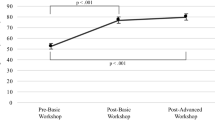Abstract
Objective
The authors propose that motivational interviewing (MI), a brief intervention designed to manage ambivalence regarding complex behavior change, is well suited for integration into psychiatric residency training programs.
Methods
The authors provide a brief description of MI. In addition, based on a review of the literature the authors explore which core competencies the empirically validated, client-centered, and directive method of MI would address.
Results
The authors argue that psychiatric residency programs can effectively address several core competencies through the addition of MI training in their curricula, including Brief Psychotherapy, Patient Care, and Interpersonal and Communication Skills.
Conclusion
The implementation of MI training offers psychiatric residency programs potential benefits in several key areas. However, the authors provide guidance for important research questions to more confidently ascertain whether MI training for psychiatric residents is worthwhile.
Similar content being viewed by others
References
Miller WR: Motivational interviewing with problem drinkers. Behav Psychother 1983; 11:147–172
Knight KM, McGowan L, Dickens C, et al: Systematic review of motivational interviewing in physical health care settings. Br J Health Psychol 2006; 11:319–332
Hettema J, Steele J, Miller WR: Motivational interviewing. Annu Rev Clin Psychol 2005; 1:91–111
Poirier MK, Clark MM, Cerhan JH, et al: Teaching motivational interviewing to first-year medical students to improve counseling skills in health behavior change. Mayo Clin Proc 2004; 79:327–331
White LL, Gazewood JD, Mounsey AL: Teaching students behavior change skills: description and assessment of a new motivational interviewing curriculum. Med Teach 2007; 29: 67–71
Renner JA: How to train residents to identify and treat dual diagnosis patients. Biol Psychiatry 2004; 56:810–816
Scal P, Hennrikus D, Ehrlich L, et al: Preparing residents to counsel about smoking. Clin Pediatr (Phila) 2004; 43:703–708
Greenberg WM, Ritvo JI, Fazzio L, et al: A survey of addiction training programming in psychiatry residencies. Acad Psychiatry 2002; 26:105–109
The Mid-Atlantic Addiction Technology Transfer Center: Motivational Interviewing: Resources for Clinicians, Researchers, and Trainers. Available at http://motivationalinterview.org/index.shtml
Miller WR, Rollnick S: Motivational Interviewing: Preparing People for Change, 2nd ed. New York, NY, Guilford, 2002
Andrews LB, Burrus JW: Core Competencies for Psychiatric Education: Defining, Teaching, and Assessing Resident Competence. Washington, DC, American Psychiatric Publishing, 2004
Dunn C, Deroo L, Rivara FP: The use of brief interventions adapted from motivational interviewing across behavioral domains: a systematic review. Addiction 2001; 96:1725–1742
Handmaker N, Packard M, Conforti K: Motivational interviewing in the treatment of dual disorders, in Motivational Interviewing: Preparing People For Change, 2nd ed. Edited by Miller WR, Rollnick S. New York, NY, Guilford, 2002, pp 362–376
Swartz HA, Zuckoff A, Grote NK, et al: Engaging depressed patients in psychotherapy: integrating techniques from motivational interviewing and ethnographic interviewing to improve treatment participation. Prof Psychol: Res Pract 2007; 38:430–439
Westra HA, Dozois DJA: Preparing clients for cognitive behavioral therapy: a randomized pilot study of motivational interviewing for anxiety. Cogn Ther Res 2006; 30:481–498
Naar-King S, Lam P, Wang B, et al: Brief report: maintenance of effects of motivational enhancement therapy to improve risk behaviors and HIV-related health in a randomized controlled trial of youth living with HIV. J Pediatr Psychol 2008; 33:441–445
Channon SJ, Huws-Thomas MV, Rollnick S, et al: A multi-center randomized controlled trial of motivational interviewing in teenagers with diabetes. Diabetes Care 2007; 30:1390–1395
Angelino AF, Treisman GJ: Issues in co-morbid severe mental illnesses in HIV-infected individuals. Int Rev Psychiatry 2008; 20:95–101
Banerjea R, Sambamoorthi U, Smelson D, et al: Chronic illness with complexities: mental illness and substance use among veteran clinic users with diabetes. Am J Drug Alcohol Abuse 2007; 33:807–821
Moyers TB, Martin T, Manuel JK, et al: Motivational Interviewing Treatment Integrity 3.0 (MITI 3.0) (Coding Manual). Albuquerque, NM, University of New Mexico, Center on Alcoholism, Substance Abuse and Addictions (CASAA), 2007
Kemp R, Kirov G, Everitt B, et al: Randomized controlled trial of compliance therapy: 18-month follow-up. Br J Psychiatry 1998; 172:413–419
Grote NK, Swartz HA, Geibel SL, et al: A randomized controlled trial of culturally relevant, brief interpersonal psychotherapy for perinatal depression. Psychiatr Serv 2009; 60:313–321
Zerler H: Motivational interviewing and suicidality, in Motivational Interviewing in the Treatment of Psychological Problems. Edited by Arkowitz H, Westra HA, Miller WR, et al. New York, NY, Guilford, 2008, pp 173–193
Mojtabai R, Olfson M: National trends in psychotherapy by office-based psychiatrists. Arch Gen Psychiatry 2008; 65: 962–970
Committee on Graduate Medical Education: Psychiatric Residents as Teachers: A Practical Guide. Arlington, Va, American Psychiatric Association, 2002
Author information
Authors and Affiliations
Corresponding author
Rights and permissions
About this article
Cite this article
Kaplan, S., Elliott, H. Using Motivational Interviewing to Meet Core Competencies in Psychiatric Resident Training. Acad Psychiatry 35, 46–50 (2011). https://doi.org/10.1176/appi.ap.35.1.46
Received:
Revised:
Accepted:
Published:
Issue Date:
DOI: https://doi.org/10.1176/appi.ap.35.1.46




